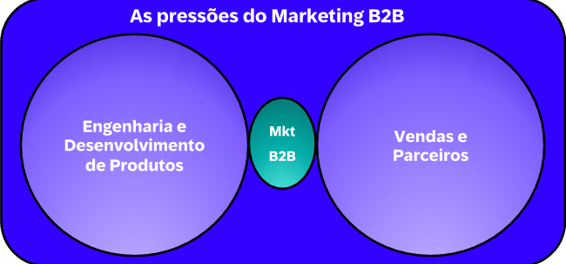The 7 steps of the B2B Marketing evolution journey
Evolution of B2B Marketing: Strategic Steps for the CMO to Drive Growth and Market Relevance
MARKETING


In the context of a B2B organization, especially one that is growing, the marketing function often occupies a challenging position. Marketing teams are often small and “squeezed” between the engineering or product development departments and the sales and partner teams.
This dynamic places additional pressure on the Chief Marketing Officer (CMO), who needs to manage not only the company's market presence, but also the building of a strong and coherent brand in a competitive environment.
Furthermore, the evolution of the B2B marketing strategy within the organization must accompany the transformation of the product portfolio and the diversification of solutions offered to customers.
As the company matures, the B2B marketing area also goes through different stages of development, adapting its strategies as the business model evolves.
The transition from individualized product sales to value sales, based on integrated solutions and focused on industrial segments, requires a more robust strategic approach aligned with long-term objectives.
In this article, we discuss the key steps a CMO should take to evolve the B2B marketing function and ensure it actively contributes to the sustainable growth of the company.
1. Establishing Solid Foundations: The Transition from Individualized Selling to Solutions
In the beginning, many B2B companies start with a more traditional approach, offering individual products in direct sales and with a limited focus on marketing channels.
In this initial phase, marketing tends to be more reactive, with small events and segmented actions focused on the direct sale of products.
The CMO, at this stage, must ensure that marketing messages are aligned with the product lifecycle and the specific needs of each customer.
Step 1: Focus on building a coherent brand presence
The CMO must ensure that brand communication is clear, consistent, and addresses customer pain points. According to a HubSpot survey, 70% of B2B marketers say that a strong brand and a coherent presence are key to building trust and increasing conversions in the marketplace.
This means that it is essential for marketing to develop a unique and visible identity, especially in the early stages of growth.
Step 2: Organize targeted events and actions
Attending industry events and hosting webinars and workshops for specific target audiences can be a great way to establish initial connections with prospects and build trust.
A study by Demand Gen Report revealed that 67% of B2B marketers said events and webinars are their primary sources for generating qualified leads.
2. Evolving to Integrated Solutions: Portfolio Integration and Industry Focus
As product offerings grow and diversify, the next step for the CMO is to transition to selling complete solutions rather than standalone products.
At this stage, the B2B marketing organization should begin to integrate its portfolios and offer broader solutions that address specific needs of industries or functional groups, such as finance, IT, HR, marketing, and operations.
To achieve this, personalizing messages and market segmentation become even more essential.
Step 3: Develop a more robust segmentation strategy
The CMO should work to deeply understand the needs and challenges of industries and target groups.
A Gartner study indicates that 85% of B2B consumers prefer vendors who can offer a customized solution that specifically addresses their industry challenges.
This requires precise segmentation and more assertive communication, adapting offers according to the sector or role of each client.
Step 4: Create a content strategy aligned with solutions
When offering more complex solutions, the CMO needs to invest in content marketing. Creating educational and demonstrative materials, such as case studies, white papers, trend reports, and webinars, can help position the company as a thought leader in the industry and facilitate the customer journey.
According to the Content Marketing Institute, 91% of B2B marketers say content marketing is an essential strategy for generating qualified leads and engagement.
3. Consolidating the Strategy: Data-Driven Marketing and Personalization at Scale
As your business continues to grow and expand, your B2B marketing strategy needs to become more sophisticated to handle larger volumes of data, customers, and channels.
At this point, data-driven marketing becomes essential. The CMO must adopt marketing automation and data analysis tools and platforms to measure the impact of their actions, optimize campaigns and personalize approaches in a scalable way.
Step 5: Invest in technology and marketing automation
Adopting marketing automation tools that integrate CRM, data analysis and performance metrics can provide valuable insights into customer behavior and optimize the user experience.
According to the Aberdeen Group, companies that use marketing automation achieve 53% more conversions and 33% more sales than those that do not use it.
Personalization at scale becomes feasible when you have the right data to accurately target and deliver the right message at the right time.
Step 6: Create a continuous feedback process with sales and engineering
As B2B marketing becomes more complex, it is crucial for the CMO to create a culture of collaboration between marketing, sales, and product engineering. This will ensure that marketing strategies are always aligned with market needs and product developments.
A Salesforce study reveals that 87% of top-performing B2B companies in marketing and sales have strong alignment between their marketing and sales teams.
4. Creating a Sustainable Growth Strategy: Brands and Strategic Partnerships
With a solid foundation in marketing integrated and customized solutions, the CMO must also seek to expand market presence through strategic partnerships.
Collaborating with other companies or industry influencers can open doors to new market opportunities and increase brand credibility.
Step 7: Invest in strategic partnerships
By aligning the company with trusted partners and industry influencers, the CMO can significantly expand brand exposure and increase penetration in target markets.
According to a McKinsey study, 72% of B2B companies say strategic partnerships are one of the main ways to drive long-term growth.


Conclusion: Steps for the CMO to Boost B2B Marketing
Adapt the marketing function to the company's growth : The CMO must transform marketing from a reactive approach to a strategic one, focused on integrated solutions and personalization for different industries and audiences.
Invest in automation and data : Marketing automation and the use of data are crucial for large-scale personalization, campaign optimization, and improving the customer experience. According to Aberdeen Group, companies that use marketing automation see 53% more conversions.
Focus on segmentation and personalization : As the company grows, the CMO should improve segmentation by industry and function, creating personalized messages and solutions. Gartner research indicates that 85% of B2B consumers prefer vendors that offer customized solutions for their specific needs.
Develop a robust content strategy : Content marketing, such as case studies and white papers, should be a cornerstone of your strategy. The Content Marketing Institute reports that 91% of B2B marketers consider content marketing essential for generating qualified leads.
Drive alignment between marketing, sales, and engineering : Good alignment between marketing and sales teams is key to ensuring campaigns are targeted and effective. Salesforce reveals that 87% of high-performing companies have strong alignment.
Seek strategic partnerships to expand your market presence : Partnering with other companies and industry influencers can accelerate growth. According to McKinsey, 72% of B2B companies consider partnerships to be one of the top ways to drive sustainable growth.
Keep your brand consistent and trustworthy : Building a strong brand and consistent market presence is essential to building trust and increasing conversions, especially in the early stages. HubSpot reports that 70% of B2B marketers believe that a strong brand is crucial to success.
Following these steps will help the CMO evolve the B2B marketing function, transforming it into an engine of sustainable growth and competitive advantage for the company.
See more articles
Featured Articles
Continue reading about B2B marketing


